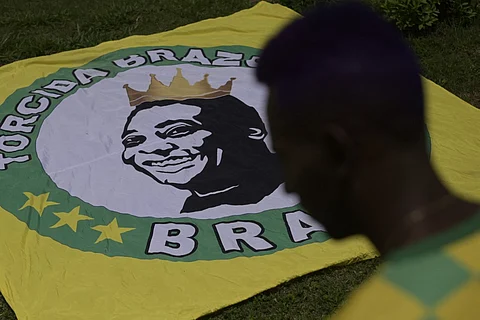

Tributes poured in from across Brazil and beyond on 30 December for football legend Pele, as the country held three days of mourning for the player widely regarded as the greatest of all time after his death at age 82.
Emotional Brazilians flocked to the Sao Paulo hospital where "O Rei" (The King) died on 29 December, and to the Vila Belmiro stadium in Santos, the city where he played most of his career—and where his wake will be held on 2 January.
That will be followed on 3 January by a massive funeral procession through the southeastern city—including past the house of Pele's mother, Celeste, who is still alive at 100—and then a private burial ceremony.
Brazilian President Jair Bolsonaro declared three days of national mourning through 1 January, as condolences flooded in from football superstars, global dignitaries and fans from all walks of life.
In Pele's hometown, the southeastern city of Tres Coracoes, house painter Marcelo Cazone proudly brandished an autographed picture of himself as a boy with Pele, which he snagged by cutting school to follow his idol around town in the 1980s.
"I treasure it to this day," he told AFP. "His death is devastating for this whole town, for all of Brazil, for the entire world."
In Santos, 46-year-old Caroline Fornari was among those who flocked to the stadium where Pele first dazzled the world.
"He's part of our history. My father was a huge fan, he talked about him from the time I was little. Pele is our greatest pride," she said of the three-time World Cup winner—the only player in history to achieve the feat.
Sao Paulo's Football Museum reported double its usual attendance, as it displayed rarely seen relics including Pele's jersey from the 1970 World Cup final.
Visitor Cristina Vidal, a 41-year-old journalist, said of her late hero: "God doesn't die. He's just gone back to Olympus."
The football world also paid emotional tribute to the man who both transformed the sport and transcended it.
Brazil star Neymar, France's Kylian Mbappe and Argentina's World Cup-winning captain Lionel Messi were among those who bowed to his legacy, while Manchester City manager Pep Guardiola called him "eternal."
The football leagues of England, Spain, Italy and France all announced they would honor Pele before upcoming matches.
In a testament to his influence, international figures including US President Joe Biden and former leader Barack Obama, Brazilian music legends Caetano Veloso and Gilberto Gil, International Olympic Committee chief Thomas Bach and FIFA President Gianni Infantino also paid tribute.
Global icon
Born on 23 October 1940, Edson Arantes do Nascimento grew up selling peanuts on the street to help his impoverished family.
He was given the nickname Pele for his mispronunciation of Bile, the name of a goalkeeper at Vasco de Sao Lourenco, where his footballer father once played.
Pele exploded onto the scene at age 15, when he started playing professionally with Santos.
At just 17, he helped Brazil to its first World Cup championship, in 1958.
That was followed by World Cup titles in 1962 and 1970. The latter marked the pinnacle of his career, as he starred on what many consider the greatest team of all time, alongside talents such as Rivellino, Tostao and Jairzinho.
Pele scored a world record 1,281 goals during his more than two decades playing with Santos (1956-74), the Brazilian national team, and the New York Cosmos (1975-77).
But he will mainly be remembered for revolutionizing football, his yellow number 10 Brazil jersey one of the most powerful images of the "beautiful game."
The first global football star, he played a key role in making the game a sporting and commercial powerhouse—and made millions himself.
'Eternal king'
Often welcomed like royalty when traveling abroad, he wielded influence far beyond the pitch, with gigs as a movie star, singer and sports minister.
But he faced criticism at times in Brazil for staying silent on social issues and racism, and for what some saw as his arrogant personality.
Unlike Argentine rebel Diego Maradona, one of his rivals for the title of greatest of all time, Pele was seen as close to those in power—including Brazil's 1964-1985 military regime.
Pele had been in increasingly fragile health in recent years, battling kidney problems and finally colon cancer.
But he remained active on social media, cheering on Brazil during the World Cup in Qatar and consoling the pre-tournament favorites when they were eliminated in the quarter-finals—just three weeks before his death.
The flags of all nations were lowered to half-mast at the headquarters of world football's governing body FIFA on 30 December, in honor of the game's "eternal king."
